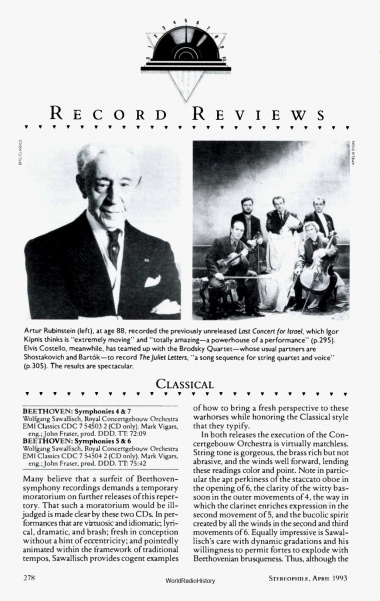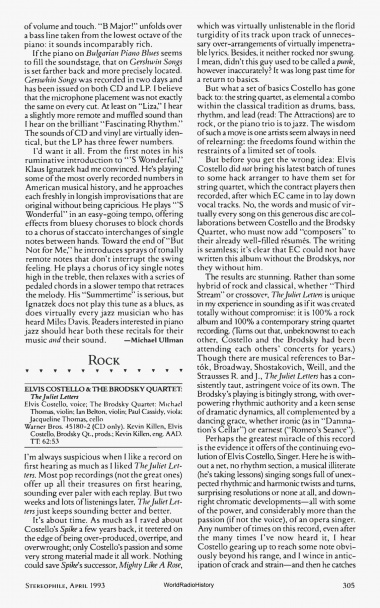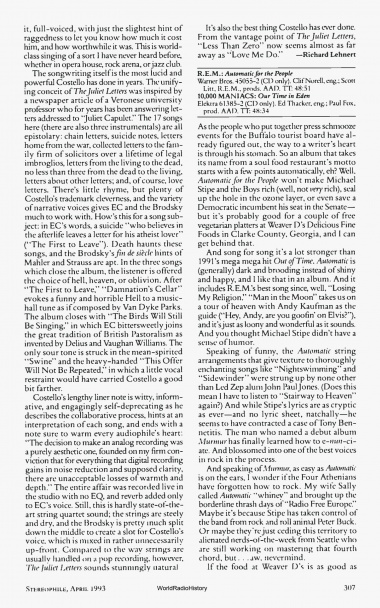Stereophile, April 1993: Difference between revisions
(start page) |
(+text part 2) |
||
| Line 9: | Line 9: | ||
<center> Richard Lehnert </center> | <center> Richard Lehnert </center> | ||
---- | ---- | ||
''' | '''<!-- Artur Rubinstein (left), at age 88, recorded the previously unreleased Last Concert for Israel, which Igor Kipnis thinks is "extremely moving" and "totally amazing — a powerhouse of a performance" (p.295). --> Elvis Costello<!-- , meanwhile, --> has teamed up with the Brodsky Quartet — whose usual partners are Shostakovich and Bartok — to record ''The Juliet Letters'', "a song sequence for string quartet and voice."<!-- (p.305) --> The results are spectacular. | ||
{{Bibliography text}} | {{Bibliography text}} | ||
I'm always suspicious when I like a record on first hearing as much as I liked ''The Juliet Letters''. Most pop recordings (not the great ones) offer up all their treasures on first hearing, sounding ever paler with each replay. But two weeks and lots of listenings later, ''The Juliet Letters'' just keeps sounding better and better. | I'm always suspicious when I like a record on first hearing as much as I liked ''The Juliet Letters''. Most pop recordings (not the great ones) offer up all their treasures on first hearing, sounding ever paler with each replay. But two weeks and lots of listenings later, ''The Juliet Letters'' just keeps sounding better and better. | ||
| Line 15: | Line 15: | ||
It's about time. As much as I raved about Costello's ''Spike'' a few years back, it teetered on the edge of being over-produced, overripe, and overwrought; only Costello's passion and some very strong material made it all work. Nothing could save <i>Spike</i>'s successor, ''Mighty Like A Rose'', which was virtually unlistenable in the florid turgidity of its track upon track of unnecessary over-arrangements of virtually impenetrable lyrics. Besides, it neither rocked nor swung. I mean, didn't this guy used to be called a punk, however inaccurately? It was long past time for a return to basics. | It's about time. As much as I raved about Costello's ''Spike'' a few years back, it teetered on the edge of being over-produced, overripe, and overwrought; only Costello's passion and some very strong material made it all work. Nothing could save <i>Spike</i>'s successor, ''Mighty Like A Rose'', which was virtually unlistenable in the florid turgidity of its track upon track of unnecessary over-arrangements of virtually impenetrable lyrics. Besides, it neither rocked nor swung. I mean, didn't this guy used to be called a punk, however inaccurately? It was long past time for a return to basics. | ||
But what a set of basics Costello has gone back to: the string quartet, as elemental a combo within the classical tradition as drums, bass, rhythm, and lead (read: The Attractions) are to rock, or the piano trio is to jazz. The wisdom of such a move is one artists seem always in need of relearning: the freedoms found within the restraints of a limited set of tools. | |||
But before you get the wrong idea: Elvis Costello did not bring his latest batch of tunes to some hack arranger to have them set for string quartet, which the contract players then recorded, after which EC came in to lay down vocal tracks. No, the words and music of virtually every song on this generous disc are collaborations between Costello and the Brodsky Quartet, who must now add "composers" to their already well-filled resumes. The writing is seamless; it's clear that EC could not have written this album without the Brodskys, nor they without him. | |||
The results are stunning. Rather than some hybrid of rock and classical, whether "Third Stream" or crossover, ''The Juliet Letters'' is unique in my experience in sounding as if it was created totally without compromise: it is 100% a rock album and 100% a contemporary string quartet recording. (Turns out that, unbeknownst to each other, Costello and the Brodsky had been attending each others' concerts for years.) Though there are musical references to Bartok, Broadway, Shostakovich, Weill, and the Strausses R. and J., ''The Juliet Letters'' has a consistently taut, astringent voice of its own. The Brodsky's playing is bitingly strong, with overpowering rhythmic authority and a keen sense of dramatic dynamics, all complemented by a dancing grace, whether ironic (as in "Damnation's Cellar") or earnest ("Romeo's Seance"). | |||
Perhaps the greatest miracle of this record is the evidence it offers of the continuing evolution of Elvis Costello, Singer. Here he is without a net, no rhythm section, a musical illiterate (he's taking lessons) singing songs full of unexpected rhythmic and harmonic twists and turns, surprising resolutions or none at all, and downright chromatic developments — all with some of the power, and considerably more than the passion (if not the voice), of an opera singer. Any number of times on this record, even after the many times I've now heard it, I hear Costello gearing up to reach some note obviously beyond his range, and I wince in anticipation of crack and strain — and then he catches | |||
| Line 27: | Line 27: | ||
{{cx}} | {{cx}} | ||
<!-- | |||
ELVIS COSTELLO & THE BRODSKY QUARTET: The Juliet Letters Elvis Costello. voice; The Brodsky Quartet: Michael Thomas, violin; Ian Belton. violin; Paul Cassidy, viola; Jacqueline Thomas, cello Warner Bros. 45180-2 (CD only). Kevin Killen, Elvis Costello, Brodsky Qt., prods.; Kevin Killen, eng. AAD. TT 62:53 | |||
--> | |||
{{rttc}} | {{rttc}} | ||
{{tags}}[[The Juliet Letters]] {{-}} [[The Brodsky Quartet]] {{-}} [[Spike]] {{-}} [[Mighty Like A Rose]] | {{tags}}[[The Juliet Letters]] {{-}} [[The Brodsky Quartet]] {{-}} [[Spike]] {{-}} [[Mighty Like A Rose]] {{-}} [[Damnation's Cellar]] {{-}} [[Romeo's Seance]] | ||
{{cx}} | {{cx}} | ||
Revision as of 18:15, 18 April 2021
|




